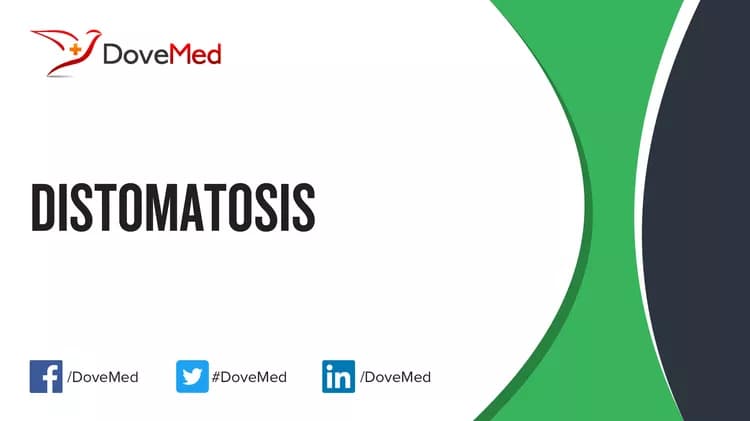What are the other Names for this Condition? (Also known as/Synonyms)
- Distomiasis
- Fluke Infection
What is Distomatosis? (Definition/Background Information)
- Distomatosis is a group of parasitoses caused by flat worms that live in contact with epitheliums
- Clinical classification depends on the organ infected by the adult parasite: liver, lungs, or intestines
- Liver fluke types include:
- Fasciola hepatica (found in France), but is more cosmopolitan
- Fasciola gigantica or giant fluke, found in tropical areas
- Dicrocoelium dendriticum or small fluke (exceptional in humans (however eggs are frequently found in stools)
- Clonorchis sinensis and Opisthorchis viverrini (found in the far East countries
- Opisthorchis felineus (found in Europe)
- Liver fluke is contracted by eating contaminated food (wild watercress, dandelion leaves or lamb's lettuce, on which larvae are encysted). Symptoms include fever, allergic reactions (dermographism), right abdominal pain, hypereosinophilia during the invasive stage, and angiocholitis attacks during the stationary stage
- Triclabendazole or Praziquantel is the treatment, depending on the infecting organism
Pulmonary flukes:
- Mainly present in the tropics, they are extremely frequent in the Far East. Freshwater crustaceans spread the infection
- Clinical signs are tuberculosis-like with no fever. Erratic cases are possible. Praziquantel is also the treatment
- Intestinal fluke types include:
- Fasciolopsis buski (far East countries), and can be contracted by eating water chestnuts;
- Metagonimus yokogawai (far East countries)
- Heterophyes heterophyes is more cosmopolitan
- The intestinal flukes can be contracted by eating water chestnuts or raw fish. All of these cause painful diarrhea. The classical treatment is niclosamide
(Source: Distomatosis; Orphanet, National Institute of Health and Medical Research (INSERM), Paris.)
Who gets Distomatosis? (Age and Sex Distribution)
- Distomatosis is a rare infectious disorder, and can occur in individuals of all ages
- Both males and females may be affected
- Worldwide, individuals of all racial and ethnic groups may be affected
What are the Risk Factors for Distomatosis? (Predisposing Factors)
The following are some risk factors for contracting Distomatosis:
- Eating contaminated food such as dandelion, wild watercress, and water chestnuts
- Consuming raw or under-cooked fish or other seafood
It is important to note that having a risk factor does not mean that one will get the condition. A risk factor increases one’s chances of getting a condition compared to an individual without the risk factors. Some risk factors are more important than others.
Also, not having a risk factor does not mean that an individual will not get the condition. It is always important to discuss the effect of risk factors with your healthcare provider.
What are the Causes of Distomatosis? (Etiology)
- Distomatosis is a group of parasitoses caused by flat worms that live in contact with epitheliums
- Depending on the organ affected, these parasites can be classified as
- Liver flukes- examples include Fasciola hepatics, Fasciola gigantica, Dicrocoelium dendriticum, Clonorchis sinensis, Opisthorchis viverrini and Opisthorchis felineus
- Pulmonary flukes
- Intestinal flukes- examples include Fasciolopsis buski, Metagonimus yokogawai and Heterophyes heterophyes
- The immature worms spread to humans via consumption of raw or uncooked foods, such as dandelions, watercress, fish or other seafood
(Source: Distomatosis; Orphanet, National Institute of Health and Medical Research (INSERM), Paris.)
What are the Signs and Symptoms of Distomatosis?
The signs and symptoms of Distomatosis may include:
- Liver fluke infection resulting in:
- Fever
- Allergic reactions (dermographism)
- Right abdominal pain
- Hypereosinophilia
- Angiocholitis attacks
- Lung fluke infection resulting in tuberculosis-like, without fever
- Intestinal fluke infection resulting in painful diarrhea
(Source: Distomatosis; Orphanet, National Institute of Health and Medical Research (INSERM), Paris.)
How is Distomatosis Diagnosed?
Distomatosis is diagnosed on the basis of the following information:
- Complete physical examination
- Thorough medical history evaluation
- Assessment of signs and symptoms
- Laboratory tests, which may include sputum or stool test
- Imaging studies
- Biopsy studies, if necessary
Many clinical conditions may have similar signs and symptoms. Your healthcare provider may perform additional tests to rule out other clinical conditions to arrive at a definitive diagnosis.
What are the possible Complications of Distomatosis?
The complications of Distomatosis may include:
- Dehydration
- Chronic liver disease, with jaundice
- Liver failure
- Respiratory problems, shortness of breath
Complications may occur with or without treatment, and in some cases, due to treatment also.
How is Distomatosis Treated?
The treatment for Distomatosis is dependent upon the infecting parasite. The following are some standard treatments for the following conditions:
- Liver fluke infection: Triclabendazole, Praziquantel
- Lung fluke infection: Praziquantel
- Intestinal fluke infection: Niclosamide
(Source: Distomatosis; Orphanet, National Institute of Health and Medical Research (INSERM), Paris.)
How can Distomatosis be Prevented?
The following tips may help prevent Distomatosis from occurring:
- Avoiding consumption of certain leafy vegetables, such as dandelion (also known as lamb’s lettuce), without cooking
- Thorough washing and or cooking of certain aquatic plants, such as watercress and water chestnut, before consumption
- Not consuming raw or undercooked fish or other seafood
What is the Prognosis of Distomatosis? (Outcomes/Resolutions)
- The prognosis of Distomatosis is dependent upon the severity of the signs and symptoms and associated complications, if any
- Individuals with mild conditions have better prognosis than those with severe symptoms and complications
- Typically, the prognosis may be assessed on a case-by-case basis
Additional and Relevant Useful Information for Distomatosis:
The following DoveMed website link is a useful resource for additional information:
Related Articles
Test Your Knowledge
Asked by users
Related Centers
Related Specialties
Related Physicians
Related Procedures
Related Resources
Join DoveHubs
and connect with fellow professionals


0 Comments
Please log in to post a comment.